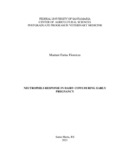| dc.creator | Fiorenza, Mariani Farias | |
| dc.date.accessioned | 2021-08-26T19:05:02Z | |
| dc.date.available | 2021-08-26T19:05:02Z | |
| dc.date.issued | 2021-02-26 | |
| dc.identifier.uri | http://repositorio.ufsm.br/handle/1/22080 | |
| dc.description.abstract | Studies highlighted the role of the immune system during the establishment of pregnancy. Maternal immune response has to find a balance to avoid any damage to the conceptus and maintain its function in combating microbes. When pregnancy cannot achieve this balance, losses might occur. Intercommunication between mother and conceptus is fundamental during early pregnancy to dictate the outcome of pregnancy. During pregnancy, the embryo signals to the maternal system its presence mainly locally via interferon tau (IFNT), and any stress factor can disrupt the signaling. The maternal immune response can alter between anti- and pro-inflammatory type, but usually, in the first few days (e.g., day 7), anti-inflammatory responses are established. IFNT concentration begins to be detected in circulation around day 12 of pregnancy in low concentrations, suggesting that maternal immune modulation does not occur by the direct effect of IFNT during this time. However, it’s unclear how amplification of IFNT signal in circulation occurs. Based on that, the present study focuses on determining IFNT effects in polymorphonuclear (PMN) cells and if immune cells can amplify embryonic signals to other immune cells in vitro. And if the signaling in PMN can be disrupted by stressor factor, i.e., heat stress in vivo. The first study demonstrated that IFNT could generate anti-inflammatory responses and upregulation of ISGs expressions in PMNs, subsequently amplifying and transferring IFNT signals to a new cell population via a cell-to-cell communication mechanism possibly mediated by IFNA. The second study demonstrated that heat stress modulates PMN responses with greater anti- and pro-inflammatory cytokines expressions in different early pregnancy days. These findings might provide a better understanding of the modulation of innate immune responses during maternal recognition of pregnancy. | eng |
| dc.description.sponsorship | Coordenação de Aperfeiçoamento de Pessoal de Nível Superior - CAPES | por |
| dc.language | por | por |
| dc.publisher | Universidade Federal de Santa Maria | por |
| dc.rights | Attribution-NonCommercial-NoDerivatives 4.0 International | * |
| dc.rights.uri | http://creativecommons.org/licenses/by-nc-nd/4.0/ | * |
| dc.subject | Neutrophils | eng |
| dc.subject | Interferon tau | eng |
| dc.subject | Tolerance | eng |
| dc.subject | Hyperthermia | eng |
| dc.subject | Inflammation | eng |
| dc.title | Neutrophils response in dairy cows during early pregnancy | por |
| dc.type | Tese | por |
| dc.description.resumo | Não possui resumo em português. | por |
| dc.contributor.advisor1 | Fiorenza, Mariani Farias | |
| dc.contributor.advisor1Lattes | http://lattes.cnpq.br/7258679373419746 | por |
| dc.contributor.referee1 | Miyamoto, Akio | |
| dc.contributor.referee2 | Comim, Fabio Vasconcellos | |
| dc.contributor.referee3 | Silveira, Juliano Coelho da | |
| dc.contributor.referee4 | Emanuelli, Mauren Picada | |
| dc.creator.Lattes | http://lattes.cnpq.br/7327097083986003 | por |
| dc.publisher.country | Brasil | por |
| dc.publisher.department | Medicina Veterinária | por |
| dc.publisher.initials | UFSM | por |
| dc.publisher.program | Programa de Pós-Graduação em Medicina Veterinária | por |
| dc.subject.cnpq | CNPQ::CIENCIAS AGRARIAS::MEDICINA VETERINARIA | por |
| dc.publisher.unidade | Centro de Ciências Rurais | por |



